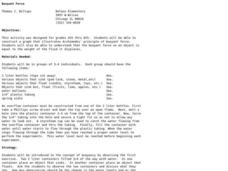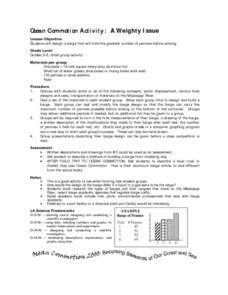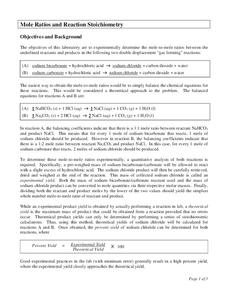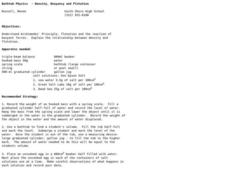Curated OER
Density and Buoyancy Lesson Plan
Students investigate why some objects float or sink in water. In this physics activity, students calculate the density of clay ball using a mathematical equation. They write a complete lab report about the experiment.
Curated OER
Lung Limit
Students determine their lung capacity by completing a science experiment with a bottle of water. In this lung science lesson, students discuss the lungs' purpose. Students complete an experiment to determine their lung capacity using a...
Curated OER
Floaters and Sinkers
Fifth graders define density as the amount of mass per volume a material contains, compare the densities of several types of materials, especially those that sink in water compared to those that float. They use two different methods to...
Curated OER
Studying Fossils
Students study the Evolution in the Light of Fossils. Activities in this activity range from quantitative measurements of hominoid skulls to the comparison of hominoid bone structures. They hypothesize dinosaur size and speed by looking...
Curated OER
Will it Float?
First graders discuss why some things sink and some float after dropping a variety of items into water.
Curated OER
The Buoyancy Factor
Students examine why some objects float in water while others sink and the ability of something to float does not depend entirely on its weight. Archimedes' principle is introduced and buoyant force is discussed. Practice calculations...
Curated OER
What is your lung?s capacity?
Students observe and determine what their lung capcity is. They fill a two-liter bottle completely with water and place the cap back on. Students fill a dishpan half full of water. They place the cap-end of the bottle into the water in...
Curated OER
Buoyant Force
Students illustrate Archimedes' Principle of Buoyant Force. In this graphing lesson, students will observe that the buoyant force on an object is equal to the weight of the fluid it displaces. Students will then create a graph showing...
Curated OER
Float My Boat
Fourth graders, in groups, experiment with density and the displacement of water by creating and designing their own boats and seeing which boat holds the most centimeter cubes without sinking..
Curated OER
Estimating the Live Mass of Dinosaurs
Learners estimate the live mass of dinosaurs. Using dinosaur and modern animal models, students use simple displacement methods to calculate the volume of the models. They calculate the masses of each model. Learners compare the...
Curated OER
A Weighty Issue
Want to get your students motivated in science class? Given only a piece of aluminum foil, assign groups the task of designing a "barge" that will support the weight of a bunch of pennies. The group who is able to put the most...
Curated OER
#24 How Much Air Is In Foamed Polystyrene Products?
Students are challenged to come up with a good estimate of the amount of air in foamed polystyrene products. They use this gas evolution experiment and as such have students measure the gas generated when foamed polystyrene is degassed...
Curated OER
Everybody Needs a Rock
Students describe and classify rocks that they have chosen. They estimate and find the mass of their rocks.
Curated OER
Give Me a Tall Ship
Sixth graders develop an understanding of floating, sinking, density, and buoyancy and apply it to the design of testing of ships.
Curated OER
Properties of Matter
Students investigate the properties of matter. In this properties of matter lesson plan, students observe containers of different metals and discuss their properties including density. Students find the density of an unknown metal and of...
Pennsylvania Department of Education
Volume of Regular and Irregular Objects
Fifth graders examine patterns and relate to equations to solve math problems. In this patterns activity, 5th graders diagram, graph, use models and use tables to solve equations for real world problems.
Curated OER
Everybody Needs a Rock
Here is a lesson that rocks! Young scientists choose a rock and list words that describe it. They estimate the mass of their rocks and rank them within a group. They measure their rocks for volume and write a story that somehow includes...
Micron Technology Foundation
Early - Weather and Seasons
Young scientists from any region can take a scientific journey and be exposed to weather changes that include rain and snow.
Santa Monica College
Mole Ratios and Reaction Stoichiometry
Stoichiometry sounds complicated, but it really means the study of the amount of substances involved in a reaction. The sixth instructional activity in an 11-part series has scholars use stoichiometry to find the theoretical yield of a...
Curated OER
Arkansas and NAFTA
Build literacy through social studies and reading strategies. This lesson focuses on using pre-reading, vocabulary building, and comprehension questions to boost literacy while educating learners on international trade, NAFTA, and...
Curated OER
Bathtub Physics - Density, Buoyancy and Flotation
Students study Archimedes' Principle, flotation and the reaction of buoyant forces and explain the relationship between density and flotation.
Curated OER
Density in Relation to Float and Sink
Students explore the concept of density. For this density lesson, students determine the density of various objects. Students use the density of the various objects to predict the density of various unknown solutions.
Curated OER
Discovering Density
Students explore the physical properties of density. In this hands-on lesson, students calculate density and distinguish between intensive and extensive properties.
Curated OER
Boat Design
Students build a boat and make predictions. In this geometry lesson, students design a cargo boat. They must show that the boat they designed can carry the cargo.
Other popular searches
- Volume Water Displacement
- Displacement of Water
- Volume by Water Displacement
- Measuring Water Displacement
- Water Displacement Method
- Volume Displacement of Water
- Water Displacement Math
- Mass vs. Water Displacement
- Mass vs Water Displacement























